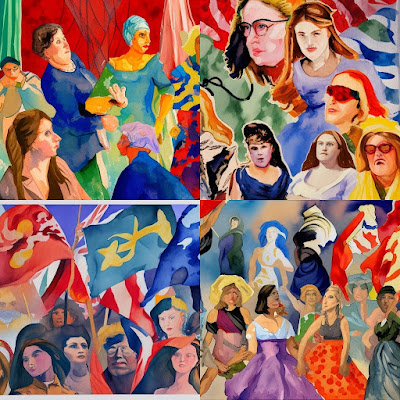Tony Blair, Olympic impact & development jargon from the 80s
Next time someone in your family, workplace or community questions development or has a really, really critical question about the aid industry do NOT point them in the direction of plastic-worded Tony Blair. Because as Tony Blair demonstrated in his ramblings on the long-term benefits of the Olympic Games (Tony Blair tells London 2012 critics to show 'a bit of pride'), all this talk about 'impact', 'evidence-based policy', 'sustainability' and how to spend the precious money of the taxpayer does not seem to matter when it comes to grand projects like the London Olympics. If you read the full GUARDIAN piece and basically replace 'Olympics' with, say, Millennium Villages, you would be criticised left, right and centre, because Blair uses a jargon that partly seems to be straight out of a World Bank infrastructure project document of the mid-1980s. His ramblings also show what a huge and sometimes ridiculous amount of pressure is put on today's development work to demonstrate (short-term) impact and how it is often treated very differently than other public policy areas (sometimes impact really takes 10 years to surface). But it also shows how advanced some areas of development monitoring and evaluation have become, because who would dare to approach a £9bn-development project like this (well...maybe some big donors actually would still use similar language?!?):
The former prime minister said it would be a decade before the success of the London Games could be judged
Excellent, let's adopt this for all of today's DfID's projects, too.
Of course, £9bn is in one sense a lot of money but, in another sense, you're regenerating an entire part of the country, creating thousands of jobs and there's massive amounts of investment coming in
Well, except that many service providers are exempt from tax. Again, imagine a development project that would promote tax-havens and broad goals like 'creating thousands of jobs'.
Blair, who said he still "worked out four or five times a week" at the age of 59, said he was convinced of the link between elite sporting success and grassroots participation – despite the fact that no previous Olympics have persuaded more people to play sport in the host country.
"I basically do buy it. If you look at cycling in the UK today, and I've got no scientific evidence for this at all, but I think it really does make a difference. Andy Murray in tennis, these big sporting icons can draw people into sport."
I have no idea where cycling comes into this, but the good news is I can just say 'I've got no scientific evidence'...and yes, that 'trickling-down' thing works everywhere...sports, Africa, incomes.
We need a greater linking up between government, sports organisations and the grassroots, he said.
There's probably a donor coordination group who could do just that...
The infrastructure is now the thing the Olympic committee more or less take for granted. What we added was a sense of London as a modern, multicultural, multi-faith city.
I included this quote just for laughs in the beginning, but it really fits well into the discourse of Western development and how it engages with local cultures and different religions...
You can always do more. But I think we did a lot in terms of facilities, sports co-ordinators in schools and so on. But now I have a sports foundation, we find there is a big unmet need still there, he said.
Ah...the famous 'big unmet need' that needs to be addressed by a new bureaucratic entity foundation.




Comments
Post a Comment